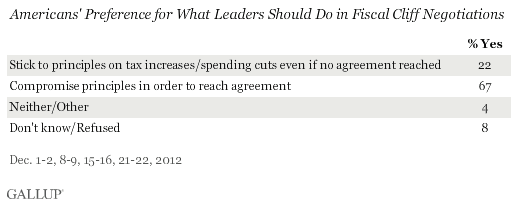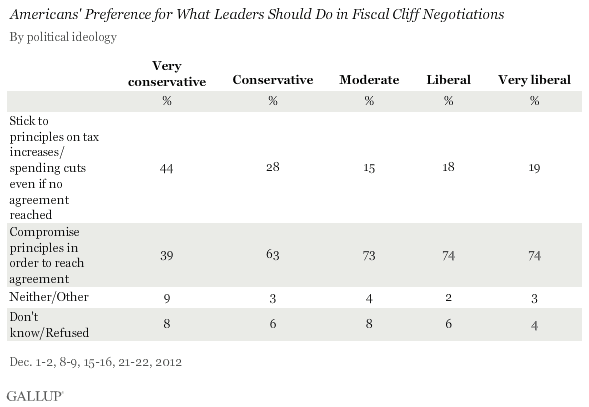Gallup asked Americans the following question on four successive weekends from Dec. 1-Dec. 22 -- for a total sample size of 4,170 randomly selected national adults:
What would you like to see government leaders in Washington do in the fiscal cliff negotiations -- [ROTATED: stick to their principles and beliefs on tax increases and spending cuts, even if no agreement is reached by the Jan. 1 deadline, (or) compromise on their principles and beliefs on tax increases and spending cuts in order to reach an agreement by the Jan. 1 deadline]?
Aggregated together, 67% of respondents said that leaders should compromise on their principles and beliefs on tax increases and spending cuts. Twenty-two percent said that leaders should stick to their principles and beliefs, even if no agreement is reached by the Jan. 1 deadline.
This is a pretty straightforward result. It has been replicated in polls conducted by CBS News and NBC News/Wall Street Journal. It is clear that the majority of the American people want their leaders to get away from their rigid beliefs that only they (the leaders) have the "right" perspective. Americans want their elected representatives to bend on principles and beliefs to reach an agreement that will avoid the cliff.
Americans' interest in compromise arises in part from the fact that Americans believe it is very important to avoid going over the cliff. Gallup polling shows that Americans believe that going over the cliff would have a negative impact on the nation as a whole and on their personal financial situations. ABloomberg poll question showed that about two-thirds of Americans believe that going over the cliff would destabilize the economy and send the country back into recession. The stock market itself has been down this week. This is apparently in response to fears that the cliff will not be avoided.
If each elected representative in the House of Representatives made a decision based on the attitudes of the totality of the American people, each would seek compromise and avoid the fiscal cliff.
The fiscal cliff stalemate in Washington reflects the complex and highly researched process of negotiating. Most people in a negotiation come in with the feeling that they have the correct/rational position. They have desired outcomes. They have a strong interest in maintaining their positive presentation of self, or face. They dislike the idea of conceding. They may dislike the people with whom they are negotiating. NHL hockey fans this year are seeing this played out as players and management have sailed over their own "hockey cliff." It is not easy "getting to yes" in situations in which both sides have strong vested interests.
Yet, as we have seen, it is the desire of the American people that their elected representatives do just that.
Of course, representatives may believe that it is their place to ignore the wishes of the people and do what they think is right regardless.
Or, representatives may believe that it is their place to represent only the people in their districts, not the totality of the American public.
That latter point is important. If Americans' overall attitudes were distributed equally, about 67% of the residents in every district in the U.S. would tell their representative to compromise. These attitudes are not distributed equally, however.
I looked at the responses to the "compromise" question across ideological groups. The large sample size from December interviewing allows us to view detailed ideology, ranging from very conservative to very liberal. The results show significant majority support for the compromise position in four of the five ideology groups. The exception comes among the roughly 9% of the adult population who label themselves "very" conservative. These Americans tilt toward the "stick to your principles" position over the compromise position, by a 44% to 39% margin.
Those who label themselves as "conservative" but not "very conservative," about 29% of the population, are slightly below the sample average of 67% favoring compromise. But they still strongly favoring compromise. More than seven in 10 moderates, liberals, and those who are "very" liberal favor compromise.
We don't have the ability to map this five-part ideology measure across states or across all 435 congressional districts. We do know that the broader, three-part measure of ideology is distributed quite unequally across the nation. For all of 2011, 53% of residents of Mississippi labeled themselves as conservative, compared with 19% in the District of Columbia and 29% in Massachusetts. We extrapolate these state data and make the assumption that congressional districts also vary widely in the ideological composition of their residents.
If proportioned equally, 9% of each congressional district would be very conservative. This is not the case, of course. We are willing to assume that some districts have a much higher proportion of those who are very conservative than others. Representatives from these districts would be more inclined to stick to their principles rather than compromise, if they interpreted their duty as representing their constituencies. As a thought process, we could hypothesize a situation in which the 9% of the population that is very conservative is spread out such that they constitute slightly above 50% of as many districts as possible. That would yield slightly more than 75 districts consisting of a majority of very conservative citizens.
More broadly, we can go back to our basic data on compromise. Remember that 22% of all American adults advocate that representatives stick to their principles. If these people were spread such that they constituted slightly above a majority of as many districts as possible, that would come to about 190 districts. In other words, it could be possible to have a situation with 190 Representatives representing districts in which a slight majority of their constituents advocated sticking to their principles rather than compromising on the fiscal cliff.
This would still be less than a majority of the House, of course. But, because most of these districts, we can assume, would be Republican, it is clear why it is difficult to achieve a situation in which the House Republican leaders could assemble enough votes for a compromise solution.
These are all very hypothetical scenarios, and ones in which we assume that elected representatives attempt to follow their districts' wishes. It is possible that elected representatives could vote based on what the totality of the American population wants, not just those in their districts. If this was the case, every one of the 435 members of the House would vote for compromise because 67% of the totality of the people want compromise.
The actual situation lies somewhere in between the extremes. Enough representatives apparently believe that a) their constituents want them to stick to their principles and not compromise and b) it is their duty to represent their constituents rather than the totality of the American population, to logjam the effort to reach a compromise in the House.


